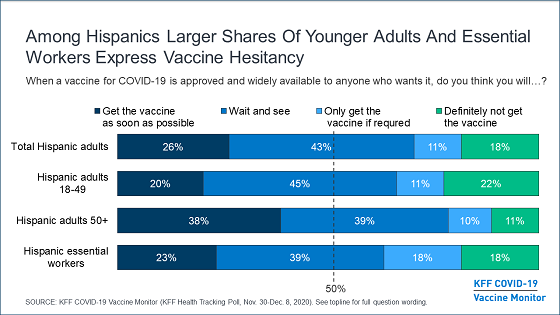
The independent source for health policy research, polling, and news.
Most Hispanic Adults Lean Towards Getting a COVID-19 Vaccine, But Many Younger Adults are Hesitant
Younger Hispanic Adults are Less Likely to Express Confidence that the Vaccine Is Safe and to See Vaccination as a Shared Responsibility
A new analysis of KFF COVID-19 Vaccine Monitor survey data finds that most Hispanic adults across the country want to get a COVID-19 vaccine at some point though younger adults are more hesitant, in part because of lower confidence that it is safe and effective.
Overall a quarter (26%) of Hispanic adults say they will get a COVID-19 vaccine “as soon as possible” and an additional 43% say they will “wait until it has been available for a while to see how it is working for others” before getting it. Fewer say they will only get a vaccine “if required to do so for work, school or other activities” (11%) or that they “will definitely not” get the vaccine (18%).
In addition, a quarter (26%) of Hispanic adults say they definitely or probably won’t get the vaccine, similar to the national average (27%), while some of the most vaccine-hesitant groups are Black adults (35%), rural residents (35%) and Republicans (42%).
The data shows a wide age divide, with Hispanic adults under age 50 twice as likely to say they “definitely will not” get the vaccine as older Hispanic adults (22% and 11%, respectively). In addition, nearly one in five (18%) Hispanic essential workers (who also tend to be younger) say they would “definitely not get” a vaccine, a potential concern for vaccination efforts since they are required to work outside their homes and are more likely to have interactions with other people.
The age gap reflects differences in attitudes about a COVID-19 vaccine.
Older Hispanic adults are more likely than younger ones to express confidence that a vaccine has been proven safe and effective (73% vs. 56%). In addition, two thirds of older Hispanic adults also say getting a COVID-19 vaccine is “part of everyone’s responsibility to protect the health of others,” while younger ones are about as likely to say so (48%) as to say it is “a personal choice” (50%).
These findings suggest that younger Hispanic adults may need to be reassured about vaccine safety and could be more receptive to messages about how vaccination would protect themselves and allow their lives to return to normal than about the impact on the broader community. Similar to the public at large, a large majority of Hispanic adults say they would trust vaccine information from their own doctor or health care providers (75%). Most also say they would trust information from the CDC (71%), the FDA (66%), their local public health department (65%), Dr. Anthony Fauci (62%) and President-elect Joe Biden (58%).
Many Hispanic adults also face additional barriers to getting vaccinated, such as lack of health insurance or a usual source of care, lack of information about the vaccine being cost-free, and logistical barriers such as limited transportation.
